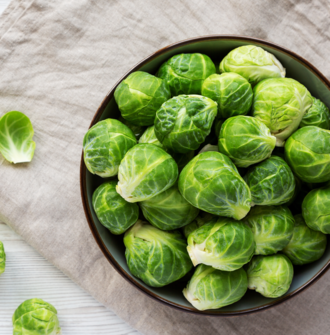Brussels Sprouts
Brussels Sprouts are little sprouts that grow on a tall thick stalk. They look like miniature cabbages and are between 2.5 and 4 cm in diameter. They grow well in BC and are popular in fall and winter cooking. Brussels Sprouts are part of the cruciferous family along with broccoli, cabbage, bok choy and cauliflower. Cruciferous vegetables are good sources of a phytochemical known as glucosinolates. These nutrients are broken down in the GI tract and are converted into isothiocyanates and indole-3-carbinol. Isothiocyanates and indoles help fight cancer and may help stop tumor cell growth. Regular consumption of Brussels Sprouts has been shown in research to reduce the risk for both cancer and stroke. They also contain zeaxanthin and lutein, known to reduce the risk of macular degeneration.
Nutrition:
In ½ cup of Brussels Sprouts (4 sprouts) there are only 30 kcal, 3g fibre and 6g carbohydrates. They are a good source of Vitamin C (52mg), Vitamin K (118ug), folate, calcium, iron and Vitamin A.
Buying:
Typically, you buy Brussels Sprouts loose, cut off the stalk, although at some stores when sprouts are in season you can buy them still on the stalk. Look for bright green, firm and compact Brussels without yellow leaves. The stem should be white.
Storage:
If you buy the sprouts still on the stem, simply give the sprout a twist and it comes right off. If needed use a small knife and cut them off. Remove any loose or discoloured leaves. Store them wrapped in paper towel in a plastic bag in the crisper of the fridge for up to 3 weeks.
Preparing/Cooking:
Before cooking, remove any lose or yellow leaves, trim the stem and cut as desired. If cooking whole, make a small cross in the stem to allow the heat to enter into the sprout. Be sure not to overcook them or they will have a sulfurous odour. To check if they are done, insert a knife into the stem and it should be barely tender. For roasting large sprouts, cut them in half, toss is olive oil and sea salt and cook cut side down to caramelize the surface. Brussels Sprouts can also be steamed, sautéed or braised. I recommend avoiding boiling as you lose Vitamin C and the phytochemicals in the cooking water. Try grating raw Brussels sprouts into a superfood salad, add sprouts cut into quarters to your vegetable soup or sprinkle roasted Brussels sprouts with toasted nuts or parmesan.














